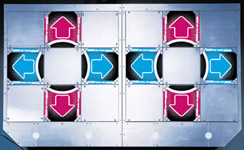Topic: The Mission
 Last night I told Jenny that I would be taken out for lunch today.
Last night I told Jenny that I would be taken out for lunch today.
“Again?” she asked.
It’s true that we get fed just ridiculously often at this job. In fact, just last night there was a reception in honor of something to do with the proposed Convention on the Rights of the Disabled, a project on which our Minister Kang has taken a leadership role. According to a Bosnian woman I met there, Korea has a reputation for having good spreads at our functions, and last night the buffet was in high form: sushi, fried and steamed dumplings, beef cubes, smoked salmon croquettes, lavish desserts, songpyeon (pounded rice cakes, pictured above). In fact, much of the fun last night was watching the many non-Korean guests try to figure out the tteok:
“What is that?”
“Is it sweet?”
“No, it’s … it’s kind of salty.”
“Is it good?”
“I’m not sure.”
Today a large group of us were taken to Woo Chon, a fine Korean restaurant on 36th Street. This is the same place where we went way back in December for barbecue, but today’s lunch was more subdued, if only slightly. There was still soju (rice wine), this time with cucumber steeping in it, which gave it a surprising delicacy and lightness. Then there were numerous shared dishes, including some Korean-Chinese sweet and sour chicken, as well as the dreaded nakji (octopus). And then came the dishes we’d ordered for ourselves. I’d asked for samgyetang (a mild soup consisting of ginseng, jujubes and a whole spring chicken stuffed with rice, pictured right), which elicited a round of knowing o-o-oh’s from everyone. At first I thought this was because I’d ordered in Korean, which consisted of using the word “chuseyo,” which means “please bring me.” But later Yoo Dae-jung explained to me that samgyetang is “good for health — especially men.” It’s normally a summer dish, but I was craving it, and Woo Chon served the best I’ve ever had, in a bowl that could easily serve two. Woo Chon serves by far the best Korean food I’ve had in Manhattan, and in New York its only rival is Kum Gang San in Flushing. Of course, this is based on my fairly limited sampling. Still, if you’re looking for quality, authentic Korean cuisine, you could do worse than Woo Chon — which, of course, gets the seal of approval from a passel of Korean diplomats.
And then came the dishes we’d ordered for ourselves. I’d asked for samgyetang (a mild soup consisting of ginseng, jujubes and a whole spring chicken stuffed with rice, pictured right), which elicited a round of knowing o-o-oh’s from everyone. At first I thought this was because I’d ordered in Korean, which consisted of using the word “chuseyo,” which means “please bring me.” But later Yoo Dae-jung explained to me that samgyetang is “good for health — especially men.” It’s normally a summer dish, but I was craving it, and Woo Chon served the best I’ve ever had, in a bowl that could easily serve two. Woo Chon serves by far the best Korean food I’ve had in Manhattan, and in New York its only rival is Kum Gang San in Flushing. Of course, this is based on my fairly limited sampling. Still, if you’re looking for quality, authentic Korean cuisine, you could do worse than Woo Chon — which, of course, gets the seal of approval from a passel of Korean diplomats.


